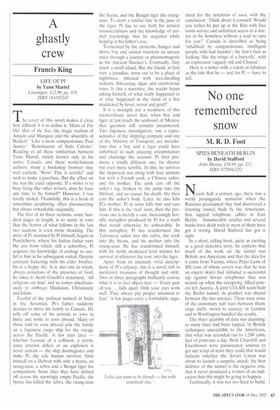A ghastly crew
Francis King
LIFE OF PI by Yann Martel Canongate, £12.99, pp. 319, ISBN 184195245 The cover of this novel makes it clear how difficult it is to define it. 'Hints of The Old Man of the Sea, the magic realism of Amado and Marquez and the absurdity of Beckett.' Like a more compassionate Paul Auster."Reminiscent of Italo Calvino.' Reading of all these similarities between Yann Martel, widely known only in his native Canada, and these world-famous authors, many a bookshop browser may well exclaim, 'Wow! This is terrific!' and rush to make a purchase. But the effect on me was the exact opposite. If a writer is so busy being like other writers, does he have any time to be himself? However, I was totally misled. Thankfully, this is a book of sometimes perplexing, often disconcerting but always remarkable originality.
The first of its three sections, some hundred pages in length, is so sunny in tone that the horror of what follows in the last two sections is even more shocking. The story of Pi, narrated by Pi himself, begins in Pondicherry, where his Indian father runs the zoo from which, still a schoolboy, Pi acquires the knowledge of zoology so useful to him in his subsequent ordeal. Despite constant bickering with his elder brother, his is a happy life. It is also one in which, always conscious of the presence of God, he takes to heart Gandhi's statement, 'All religions are true' and so comes simultaneously to embrace Hinduism, Christianity and Islam.
Fearful of the political turmoil in India in the Seventies, Pi's father suddenly decides to move his family to Canada. He sells off some of his animals to zoos in India and some to zoos abroad. Many of those sold to zoos abroad join the family on a Japanese cargo ship for the voyage across the Pacific. A few days later — whether because of a collision, a storm, some interior defect or an explosion is never certain — the ship disintegrates and sinks. Pi, the sole human survivor, finds himself on a lifeboat with only a hyena, an orang-utan, a zebra and a Bengal tiger for companions. Soon after they have drifted off across the seemingly empty Pacific, the hyena has killed the zebra, the orang-utan the hyena, and the Bengal tiger the orangutan. To avert a similar fate in the jaws of the tiger, Pi has to use both his natural resourcefulness and the knowledge of animal psychology that he acquired while helping in his father's zoo.
Tormented by the elements, hunger and thirst, boy and animal maintain an uneasy truce through a journey as phantasmagoric as the Ancient Mariner's. Eventually, they reach a small island. But the island, at first view a paradise, turns out to be a place of nightmare, infested with tree-dwelling rodents, fish-eating algae and carnivorous trees. Is this a narrative, the reader keeps asking himself, of what really happened or of what happened in the mind of a boy maddened by fever, terror and grief?
It is a strength, not a weakness, of this extraordinary novel that, when boy and tiger at last reach the seaboard of Mexico, that question still remains unanswered. Two Japanese investigators, one a representative of the shipping company and one of the Ministry of Transport, are incredulous that a boy and a tiger could have cohabited in such amazing circumstances and challenge the account. Pi then produces a totally different one, far shorter but even more terrible. In this, he survives the shipwreck not along with four animals but with a French cook, a Chinese sailor, and his mother. The cook cuts off the sailor's leg, broken by the jump into the lifeboat, and so causes his death. He then eats the sailor's body. Later, he also kills Pi's mother. Pi in turns kills him and eats him. If this is the 'real' story, then the previous one is merely a vast, increasingly horrific metaphor produced by Pi for a truth that would otherwise be unbearable. In this metaphor, Pi has transformed the Taiwanese sailor into the zebra, the cook into the hyena, and his mother into the orang-utan. He has transformed himself, with his newly awakened feral instinct for survival at whatever the cost, into the tiger.
Apart from its intensely vivid descriptions of Pi's odyssey, this is a novel rich in incidental treasures of thought and style. Two or three paragraphs brilliantly convey what it is to feel abject fear — 'Every part of you ... falls apart. Only your eyes work well. They always pay proper attention to fear.' A few pages carry a formidable argu ment for the retention of zoos, with the conclusion: 'Think about it yourself. Would you rather be put up at the Ritz with free room service and unlimited access to a doctor or be homeless without a soul to care for you?' Canada is described as being 'inhabited by compassionate, intelligent people with had hairdos': the lion's face as looking 'like the wings of a butterfly', with an expression 'vaguely old and Chinese'.
Here is a writer with a talent as fabulous as the tale that he — and his Pi — have to tell.














































































 Previous page
Previous page